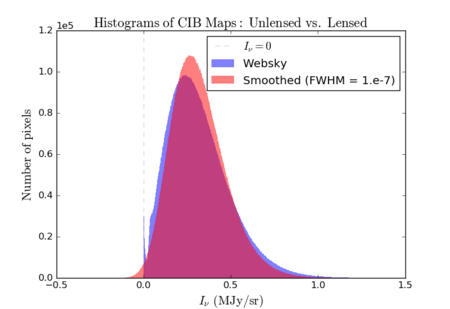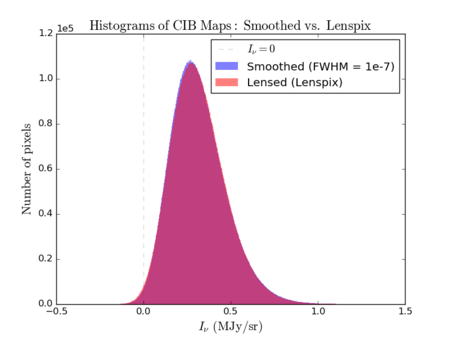June 29th, 2020 - CIB Lensing: Lenspix - Smoothing and Negative Pixels
Jump to navigation
Jump to search
Since we saw that 'lenspix' reduces the variance of the Websky CIB map, we agreed I should try smoothing the unlensed map with beam comparable to the size of a pixel. However, using an FWHM a bit smaller than the width of an average pixel would not preserve the power spectrum at high [math]\displaystyle{ \ell }[/math]'s, and the variance would become much smaller than the 'lenspix'-lensed map.
So, I subsequently made the beam smaller and smaller, until the smoothing had virtually no effect on the 2, 3, 4-point statistics and the variance of the smoothed map was comparable to that of the 'lenspix'-lensed map. (FWHM = [math]\displaystyle{ 10^{-7} }[/math] rad)
| Map Characteristics | |||
|---|---|---|---|
| Unlensed | Smoothed (FHWM = 1e-7) | Lensed (Lenspix) | |
| Max values (MJy/sr) | 6.408424 (= 400 mJy) | 5.959061 | 6.408424 |
| Min values (MJy/sr) | 0.000000 | -1.321831 | -0.322438 |
| # of pixels smaller than 0 | 0 | 1167158 | 1477969 |
| Mean | 0.3179518 | 0.3179518 | 0.3180850 |
| Variance | 0.0331789 | 0.0258813 | 0.0264728 |
| Skewness | 1.720313 | 1.150339 | 1.776150 |
| Kurtosis | 23.366768 | 11.763371 | 35.614250 |
There are discrepancies in the minimum, maximum, skewness and kurtosis values of the smoothed map with the 'lenspix'-lensed map - I believe part of this is because 'lenspix' must smooth the map with an even smaller beam, and also because I smoothed the unlensed map which already had the 400mJy fluxcut imposed (rather than smoothing, and then removing the bright pixels).
Histograms

However, the unlensed-smoothed histogram quite resembles the 'lenspix'-lensed histogram (except for a slight shift to the right for the lensed histogram).
N-point statistics (2, 3, 4-point)
Below is a sanity check to show that the smoothing did not change the n-point statistics.
Summary It is now clear that the negative pixels in the 'lenspix'-lensed map won't affect our statistical analysis - whether 'lenspix' lenses point sources accurately may be a different matter (hopefully we don't need to worry about this).


